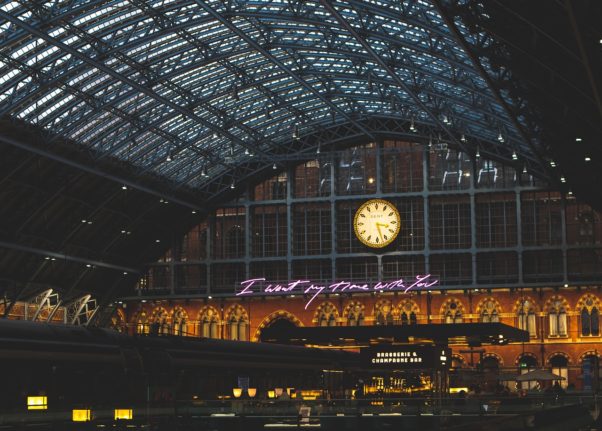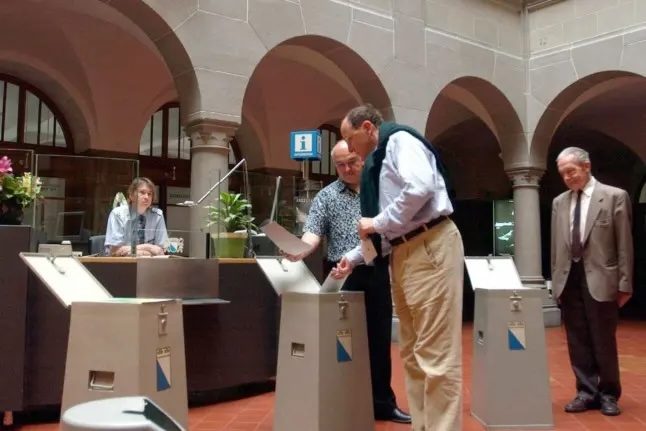Today, it takes at least seven hours to travel from Geneva to London (and vice versa) by train, and the trip is not exactly hassle-free.
The easiest way currently is to take the train from Geneva to Gare de Lyon in Paris. From there, they must take the Metro or the RER across town to Paris Gare du Nord and then embark on a connecting Eurostar train to London’s St Pancras station – after having gone through border and security checks.
At present, there aren’t more convenient connections between the two cities.
However, the momentum to create a direct railway link — which would allow people to travel between the two destinations in just over five hours — is growing.
Two lawmakers, one from Geneva and the other from Vaud, the two cantons which would benefit the most from such a rail link, have filed motions in their respective parliaments to approve this ambitious project.
Their arguments focus on the importance such a rail link would have for environmentally-conscious business and leisure travellers, who would like to reduce the harmful effects of up to 45 daily flights between Geneva and the UK capital operated by several airlines.
Basel to London first?
A similar project, connecting the northern city of Basel with London, is also under discussion at the moment.
The plan calls for an Eurostar train from Basel to reach London in about five hours via the Eurotunnel.
READ ALSO: Could a Basel to London direct train really happen?
However, as the two deputies point out, if only one direct train service between Switzerland and the UK is feasible, then the one from Geneva would make more sense.
That’s because Geneva “is a more important economic centre than Basel,” according to the Vaud MP, David Vogel.
And in terms of tourism, Geneva also trumps Basel, because the mountain resorts in Valais that British skiers favour can be reached more easily from Geneva.
Could Geneva-London link happen?
It is not only elected officials who are pushing for a Geneva-London link.
An online petition to this effect, intended for the Swiss national rail company SBB was launched by Nadine McCormick, a dual Swiss-British citizen.
She too has been arguing that a direct link to and from Geneva makes more sense to British travellers than the one with Basel.
“Geneva and London are two of the world’s most important finance and banking centres, a further reason to enhance the transport links between these two cities,” she said.
“And Geneva airport has more passengers going to London than Basel and Zurich airports combined,” McCormick added.
To date, almost 5,200 people signed McCormick’s petition, proving that interest in this connection is strong.
The petition points out there would be strong demand.
“It’s estimated that the journey would take approximately five and a half hours. The petition points out that there are 14,000 British citizens living in the Swiss cantons of Geneva and Vaud, with 5,000 in nearby French departements,” it said.
There is also approval for the Geneva-London train on social media.
Lonely Planet travel writer Nicola Williams, who is based in Lake Geneva said it the link is “such a logical rail route.”
She said: “Geneva’s train station, Gare de Cornavin, already has a huge border/customs area – manned to boot – already in place for high-speed TGVs to/from Paris in neighbouring France”.
Such a logical rail route given Geneva’s train station, Gare de Cornavin, already has a huge border/customs area – manned to boot – already in place for high-speed TGVs to/from #Paris in neighbouring #France 🚆 https://t.co/34aVXhq3Y8
— Nicola Williams (@tripalong) April 11, 2024
Another mentioned how much faster the direct train would be than the current rail link.
Direct rail link Geneva-London would be c. 5hr vs. 8-9hr on the current service with a change in Paris.
— Charles Gilson (@gripenhack) March 28, 2024
Will this project actually get off the ground?
While there is no visible opposition to the project, and assuming that as yet undetermined budget could be allocated to this project, a number of challenges still exist.
And they are pretty much the same for both the Basel to London and Geneva to London lines.
For one, the infrastructure is expensive on this route – partly because of the journey through the Eurotunnel.
From the logistics point of view, since the UK has left the EU and only participates in the Schengen Agreement to a limited extent, boarding the train in Switzerland would involve both security and passport controls akin to those required at airports, which would require new checkpoints to be created in both Geneva and Basel’s SBB station.
And given its international reach, Switzerland can’t set up the connection on its own.
According to the Federal Council, the project can only proceed in close cooperation not only with the UK and France, but also with an operating company Eurostar.
Considering all the steps that still need to be taken, the actual launch of this direct rail link is still way off in the future.



 Please whitelist us to continue reading.
Please whitelist us to continue reading.
Logistically, Geneva is the better route.as Basel means going via Dijon and linking up anyway via the TVG Mâcon-Genève. The issue is always going to be the SNCF: whether they agree to a contournement of Paris or not, or more likely, how long it would take them to decide.